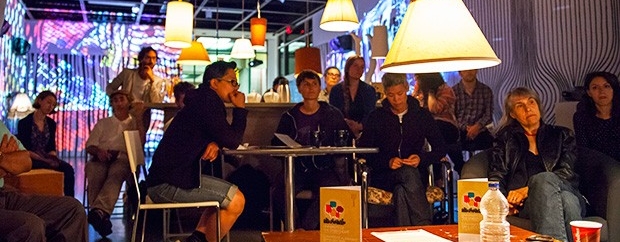Date & time
7 p.m. – 9 p.m.
Other dates
Thursday, April 11, 2024
Thursday, April 25, 2024
Wednesday, May 8, 2024
Thursday, April 11, 2024
Thursday, April 25, 2024
Wednesday, May 8, 2024
This event is free.
Office of Community Engagement
À deux mains/Head & Hands
3465 Av. Benny, Notre Dame de Grâce
One of the 10 principles of disability justice is a commitment to cross-movement solidarity. This means that social movements need to better understand ableism and also understand how it is linked to other oppressions. How do we understand disabilities in our society and how can we be in solidarity with people living with disabilities? As people committed to justice, what forms do you think this solidarity can take? What are the risks of continuing to sideline this important issue? This public conversation aims to examine our collective understanding of disability justice and to explore how advancing this cause can strengthen our feminist, anti-capitalist and anti-racist struggles.
Marie-Eve Veilleux is a disability rights activist. Creating communities exchanging information and support is at the heart of her activism. In addition to occasionally publishing open letters in magazines such as À bâbord, Marie-Eve has been a member of the teams behind such visible initiatives as the Promenades de Judy, inaugurated in the summer of 2023, and the Transport médadapté Facebook group, which has been bringing critical attention to issues related to transportation accessibility in Quebec for more than ten years. She has a bachelor's degree in microbiology and immunology, a certificate in translation and a specialized graduate diploma in translation from McGill University. Professionally, she is the translation coordinator for the Canadian Longitudinal Study on Aging. Since 2020, Marie-Eve has served on the Projet Montréal Board of Directors as Vice-President - Organization.
Moderator: Alicia Pauld (she/her) is a Montreal-based activist, public speaker and educator, writer, content creator, organizer, artist and sociology and sexuality studies graduate. As a disabled queer Black woman, a lot of her work centres around disability, gender, sexuality and race.

As a flagship program of Concordia University’s Office of Community Engagement, the public bilingual conversations are free and open to participants of all ages, backgrounds and levels of education. Since its inception in 2003, University of the Streets Café has hosted over 400 bilingual public conversations.
Follow us on our Facebook page or visit us at concordia.ca/univcafe to learn more about our programming and last-minute scheduling updates.
© Concordia University